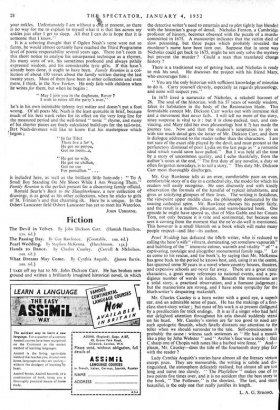Fiction
The Devil in Velvet. By John Dickson Carr. (Hamish Hamilton.
2g. 6d.) -
What Dreams May Come. By Cynthia Asquith. (James Barrie. tea. 6d.) I TAKE off my hat to Mr. John Dickson Carr. He has broken new ground and written a brilliantly imagined historical novel, in which the detective writer's need to entertain and to plot tightly has blended with the historian's grasp of detail. Nicholas Fenton, a Cambridge professor of history, becomes obsessed with the puzzle of a murder committed in 1675. A manuscript indicates that the victim died of slow poisoning, but three pages which probably revealed the murderer's name have been torn out. Suppose that in, some way Nicholas could get back to 1675, might he not only solve the mystery but prevent the murder ? Could a man thus translated change history ?
There is a traditional way of getting back, and Nicholas is ready to risk his soul. He discusses the project with his friend Mary, who encourages him : " You are the only historian with sufficient knowledge of minutiae to do it. Carry yourself cleverly, especially as regards phraseology, and none will suspect you."
In 1675 lived a namesake of Nicholas, a rakehell baronet of 26. The soul of the historian, with his 57 years of wordly wisdom, takes its habitation in the body of the Restoration • blade. This formidable conceit Mr. Dickson Carr works out with immense skill and a movement that never fails. I will tell no more,of the story, since suspense is vital to it : but it is close-packed, taut, and con- vincing, and Mary (did her own phraseology hint it ?) has made the journey too. Now and then the student's temptation to ply us with too much detail gets the better of Mr. Dickson Carr, and there is dialogue addressed to the reader rather than the characters. I am not sure of the exact role played by the devil, and must protest at the perfunctory dismissal of poor Lydia on the last page as " a romantic ideal which would soon have palled." But I was held all the time by a story of uncommon quality, and I echo thankfully, from the author's notes at the end, " The first duty of any novelist, a duty so often forgotten nowadays, is to tell a story." This duty Mr. Dickson Carr most thoroughly discharges.
Mr. Guy Rawlence tells at an even, comfortable pace an even, comfortable story of a day in a cathedral city, the model for which his readers will easily recognise. He uses discreetly and with kindly observation the formula of the handful of typical inhabitants, and gives us satisfying glimpses of their lives. The writing is fastidious, the viewpoint upper middle class, the philosophy dominated by the soaring cathedral spire. Mr. Rawlence chooses his people fairly, and the result is a mellow, pleasant, and warm-hearted book. One episode he might have spared us, that of Miss Gable and her Cousin Tom, not only because it is trite and sentimental, but because one sees it coming from the moment that the ne'er-do-well is mentioned. This however is a small blemish on a book which will make many people respect—and like—its author.
Pearl Weddink has defeated the bltub writer, who is reduced to calling the hero's wife" vibrant, dominating, yet somehow vapourish" and babbling of the " immense colour, warmth and vitality " of " a captivating, nostalgic and altogether monumental family saga." Let us come to his rescue, and the book's, by saying that Mr. McKenna has gone back to the period he knows best, and, using it as the centre, has spanned some 50 years in a novel where country houses, theatres, and expensive schools are never far away. There are a great many characters, a great many references to national events, and a pro- digious number of words in italics. Beneath the mannerisms are a solid story, a practised observation, and a humane judgement ; but the mannerisms are strong, and I have some sympathy for the blurb-writer's despairing makeshift.
Mr. Charles Causley is a born writer with a good eye, a superb ear, and an admirable sense of pace. He has the makings of a first- class short-story writer ; but most of his work is at present disfigured by a predilection for trick endings. It is as if a singer who had held our delighted attention throughout his aria should suddenly stand on his head. Mr. Causley's stories are far too good to need any such apologetic flourish, which fatally distracts our attention to the teller when we should surrender to the tale. Self-consciousness is probably the cause : witness such sentences as " He had a mouth like a play by John Webster " and " Archie's face was a study : that C sharp one of Chopin with notes like a barbed wire fence." And— please, Mr. Causley—does the title -of the fourteenth story play fan' with the reader ?
Lady Cynthia Asquith's stories have almost all the literary virtues except pace. They are memorable, the writing is subtle and dis- tinguished, the atmosphere delicately realised, but almost all are too long and move too slowly. " The Playfellow " makes one of its two points five times over, and it is no accident that the best story in the book, " The Follower," is the shortest. The last, and most beautiful, is the only one that really justifies its length.
L. A. G. STRONG.






































 Previous page
Previous page